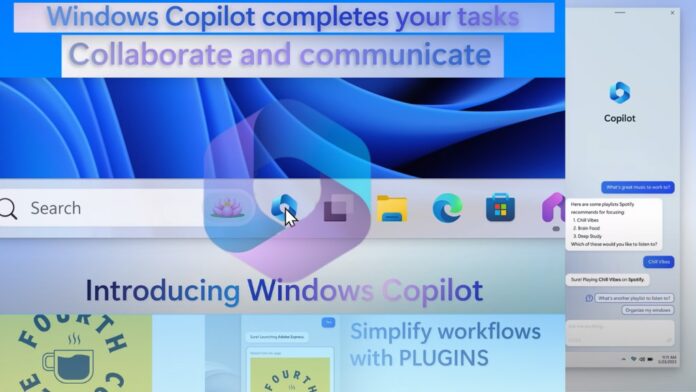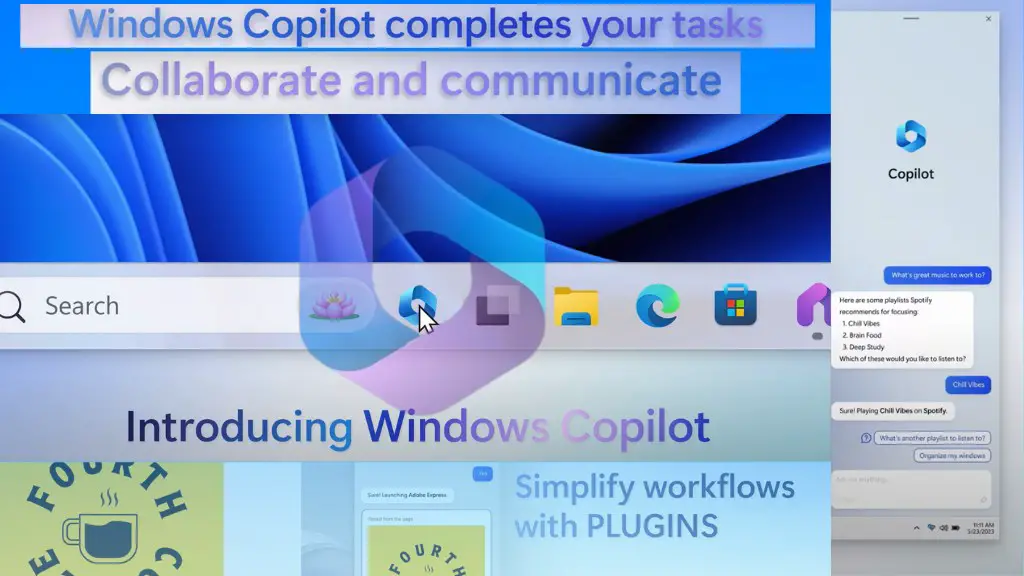Microsoft | Windows Copilot | AI Technology
In today’s digital landscape, artificial intelligence (AI) has permeated every aspect of our lives, revolutionizing the way we interact with technology. The latest advancements in AI are making waves in the tech industry, with OpenAI’s recent release of an iOS version of ChatGPT and Microsoft’s plans to introduce a range of generative AI-powered features in Windows 11. These developments have the potential to enhance user experiences and further integrate AI into our daily routines. In this article, we will explore the significance of OpenAI’s ChatGPT on iOS and Microsoft’s generative AI features in Windows 11, delving into their functionalities, impact, and implications for the future.
OpenAI’s ChatGPT on iOS: Conversational AI at Your Fingertips
OpenAI’s ChatGPT has garnered considerable attention for its conversational AI capabilities, enabling users to interact with the AI system through natural language conversations. With the recent release of an iOS version, OpenAI has extended the accessibility of ChatGPT to iPhone users, providing a seamless and intuitive interface for AI-powered conversations. This expansion not only broadens the user base but also introduces the convenience of voice input, allowing users to speak their requests for information. The integration of ChatGPT on iOS opens up new possibilities for mobile AI applications and offers greater accessibility for users on the go.
Microsoft’s Generative AI Features in Windows 11: Empowering User Interactions
Microsoft, a tech giant renowned for its innovative solutions, is capitalizing on the potential of generative AI with its upcoming features in Windows 11. At the forefront of this integration is Windows Copilot, a suite of text-driven assistive capabilities designed to simplify and enhance the user experience. Windows Copilot aims to make using PCs more intuitive by leveraging AI algorithms to provide context-aware suggestions and assistance. With the inclusion of Windows Copilot, Microsoft seeks to empower users and transform the way they interact with their Windows devices.
Windows Copilot: Revolutionizing User Interactions
Windows Copilot introduces a new dimension to user interactions, allowing users to leverage AI-powered assistance for a wide range of tasks. By clicking on a dedicated icon in the Windows taskbar, users can open a sidebar window where they can input their queries and requests. These can range from traditional internet search questions to specific instructions for adjusting Windows settings or performing actions on the PC. Users can ask Windows Copilot to turn on dark mode, initiate a focus session, or even drag and drop files from Windows Explorer into the Copilot window for instant summarization of results. The intelligent capabilities of Windows Copilot offer users a more intuitive and efficient way to navigate and utilize their Windows devices.
Integrating Bing Chat Plug-ins into Windows: Expanding Possibilities
In addition to Windows Copilot, Microsoft has announced the integration of Bing Chat plug-ins directly into Windows 11. This integration brings the power of Microsoft’s Bing search engine to the Windows environment, enabling users to access rich information, recommendations, and insights without leaving their desktops. The seamless integration of Bing Chat plug-ins enhances productivity and streamlines the search process, providing users with a comprehensive search experience within the Windows operating system. This integration showcases Microsoft’s commitment to leveraging AI technologies to enhance user interactions and simplify information discovery.
The Launch of Windows Copilot: Preview and Availability
Windows Copilot is set to launch in June, starting with a preview phase for beta testers. During this preview period, selected users will have the opportunity to experience the capabilities of Windows Copilot firsthand and provide valuable feedback to Microsoft. Following the beta testing phase, Windows Copilot will be made available to the general public later this year. This staggered release approach ensures that the product is refined and optimized before reaching a wider audience, guaranteeing a smoother and more reliable user experience.
The Potential of AI-Enabled Interactions: Transforming Workflows and Productivity
The introduction of AI-powered features like Windows Copilot signifies a paradigm shift in user interactions and workflows. The ability to request information, adjust settings, and perform actions through natural language inputs streamlines the user experience and eliminates the need for complex menu navigation or memorizing specific commands. Users can benefit from a more intuitive and efficient workflow, focusing on their tasks rather than navigating intricate settings and options.
Moreover, the ability to leverage AI for intelligent summarization of information or automated tasks opens up new possibilities for productivity and efficiency. Imagine a future where requesting information on a specific topic results in a concise summary generated by AI and seamlessly inserted into a document, or where scheduling meetings and sending invitations become automated processes driven by AI assistants. These transformative capabilities highlight the immense potential of generative AI in redefining the way we work and interact with technology.
The Shift Towards Localized AI: Offline Capabilities and Implications
While AI applications like ChatGPT and Windows Copilot heavily rely on cloud-based computing, there is a growing interest in migrating some of these features to run locally on devices. Currently, using these AI applications requires an internet connection to leverage the computational power of cloud servers. However, there are discussions and developments underway to enable AI capabilities to run offline, leveraging the computing resources available on our devices.
This shift towards localized AI has important implications for pricing, availability, security, and privacy. By reducing the dependence on cloud-based computing, companies can potentially lower costs and offer more affordable AI services to users. Additionally, localized AI can address concerns regarding data privacy and security by processing sensitive information directly on the user’s device, minimizing the need for data transfer to cloud servers.
The Energy and Cost Considerations of Generative AI
Generative AI applications, while impressive in their capabilities, have been known to be computationally demanding and power-intensive. Running AI models requires substantial computing resources, often in the form of energy-consuming data centers. As the demand for AI services and features grows, so does the need for cloud computing resources to support these applications. This increased demand poses challenges in terms of energy consumption, cost, and sustainability. However, the migration of AI tasks to localized devices can help alleviate the strain on cloud-based infrastructure, reducing energy consumption and costs associated with running AI models on remote servers. This shift towards localized AI not only benefits users but also contributes to a more sustainable and environmentally friendly AI ecosystem.
Conclusion: A Future Shaped by AI Integration
The advancements in AI, exemplified by OpenAI’s ChatGPT on iOS and Microsoft’s generative AI features in Windows 11, are propelling us toward a future where AI integration becomes ubiquitous. These developments not only offer enhanced user experiences but also pave the way for transformative changes in how we interact with technology. AI-powered assistants and personalized experiences are poised to redefine our relationship with computers and devices. As AI continues to evolve and become more accessible, we can anticipate a world where intelligent assistants seamlessly integrate into our workflows, simplifying tasks, and unlocking new levels of productivity. The future holds immense potential for AI-enabled interactions, and it is an exciting time to witness the ongoing advancements shaping the AI landscape.
Also Read: Expanding AI Horizons: Google Opens Access to Generative AI Capabilities in Search






